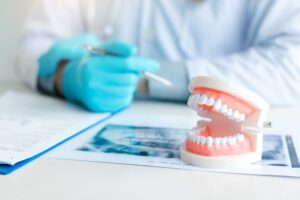
Did you know that your facial structure changes after tooth loss? This happens because your body begins to reabsorb bone mass from your jaw that’s no longer needed to support your pearly whites. For those with dentures, your restoration that once fit like a glove will eventually start to come loose and need to be relined or replaced.
It’s important to call your dentist if you notice that your dentures aren’t creating a firm bond against your gums. If you leave it unaddressed for too long, harmful bacteria can penetrate the space between your artificial teeth and the tissues in your mouth and contribute to dental issues like gum disease and infection. That means patients who regularly drink alcohol or smoke are at greater risk of developing oral cancer.
Keep reading to learn more about how your ill-fitting dentures could cause this life-threatening condition and what you can do to prevent it.
How Do Smoking and Alcohol Cause Oral Cancer?
The NIH (National Institute of Dental and Craniofacial Research) has reported that oral cancer is most likely to impact people over 40 years old who use tobacco, drink alcohol, or have HPV (human papillomavirus). This is because tobacco contains up to 50 different types of carcinogenic chemicals that make genetic changes in the cells of your mouth to cause cancer. It’s estimated just over 60% of mouth cancer diagnoses are linked to smoking.
Drinking excessive amounts of alcohol is also problematic and causes about 30% of diagnosed oral cancers. If you both drink and smoke, the risk increases by up to 30 times!
How Do Poorly Fitting Dentures Contribute to Oral Cancer?
Although there’s not a direct link between your dentures and oral cancer, a poorly fitting restoration can contribute to dental problems like gum disease. If your artificial teeth don’t create a tight seal against your gums, then germs can populate the spaces between them and accumulate. They eventually migrate below your gumline and cause infection. Unfortunately, untreated gum disease can increase the risk of oral cancer by 14% to 20%.
How Can I Prevent Oral Cancer?
The best way to prevent oral cancer is to quit smoking and drinking large amounts of alcohol. Within 5 years of quitting smoking, you’re already 35% less likely to develop this deadly disease. If you’ve quit smoking for 20+ years, then the risk is the same as someone who has never smoked.
Proper preventative care can keep your teeth and gums in better condition so you’re less likely to have issues. Brushing and flossing twice daily eradicates bacteria and plaque buildup that leads to cavities and gum disease. It’s also important to have a checkup with your dentist every 6 months so they can screen the soft tissues of your mouth for signs of cancer. In many cases, if it’s caught early enough then it can be treated. They’ll also work to ensure that your dentures fit properly so you can continue making the most of their many benefits.
If you’re worried you may have signs of oral cancer, contact your dentist to schedule an appointment right away. They’ll examine your mouth to identify whether it’s present and will work with you to restore your oral health.
About the Author
Dr. Dale Greer is passionate about providing a full array of top-quality oral health services to meet all of your dental needs. He graduated from the Baylor College of Dentistry in 1977 and is an active member of the Academy of General Dentistry and the highly acclaimed American Academy of Cosmetic Dentistry. He is highly respected in the field and is known to lecture, write articles, and attend ongoing educational opportunities to remain at the forefront of his profession. He has experience handling everything from basic preventative care to more complex procedures, so if your dentures don’t fit or you’re concerned about oral cancer, he’s an expert who can help. You’re welcome to request an appointment on the website or by calling (972) 233-4546.


